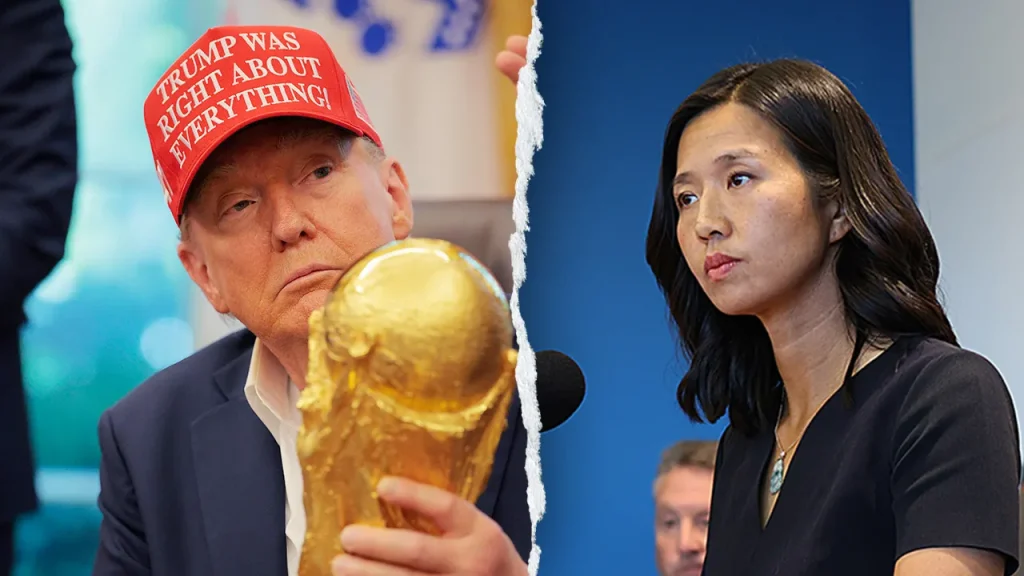Trump Threatens to Pull World Cup Games from Boston Over Safety Concerns
In a bold move during his meeting with Argentine President Javier Milei at the White House, President Donald Trump suggested he might intervene to have 2026 FIFA World Cup matches relocated from Boston due to safety concerns. Trump’s comments came in response to recent violent incidents in the city, particularly a street takeover where a police cruiser was set ablaze. The president expressed his willingness to contact FIFA President Gianni Infantino directly if he believes Boston cannot provide adequate security for the international sporting event. While acknowledging that Boston residents themselves weren’t the issue, Trump criticized Mayor Michelle Wu’s leadership, describing her as “intelligent, but radical left,” suggesting her policies were contributing to public safety issues in the city.
The incident that sparked Trump’s concerns occurred on October 5, when over 100 people participated in an early morning street takeover involving racing and direct confrontations with law enforcement. The Boston Police Department reported that participants attacked police vehicles with fireworks, traffic cones, poles, and other improvised weapons. The president of the local police union described the participants as “hell-bent” on attacking law enforcement officers. The situation escalated dramatically when one police cruiser was completely destroyed by fire and had to be towed away. This violent confrontation appears to have raised Trump’s concerns about Boston’s ability to maintain security during high-profile international events like the World Cup, where the city is currently scheduled to host seven matches, including five group-stage games, one Round of 32 fixture, and a quarterfinal match on July 9.
In response to Trump’s statements, Mayor Wu’s office released a statement to Fox News Digital, emphasizing Boston’s excitement about hosting the World Cup matches and welcoming international visitors: “Boston is honored and excited to host World Cup matches, and we look forward to welcoming fans from around the world to our beautiful city, the cradle of liberty and city of champions.” The statement notably avoided addressing Trump’s specific concerns about public safety or the recent violent incidents. This exchange comes amid ongoing tensions between Trump and Wu, with the mayor previously accusing the Trump administration of being a party that “doesn’t follow the law” and claiming that “these threats are serious and consequential” in response to earlier warnings about federal funding cuts related to immigration enforcement cooperation.
Trump’s concerns about event security extended beyond Boston, as he also mentioned he would consider pulling the 2028 Summer Olympics from Los Angeles if he believed the city was “not going to be prepared properly.” This suggests a broader approach to leveraging major international sporting events as pressure points for local governance issues, particularly in cities led by Democratic mayors. The president’s comments highlight the complex intersection of federal influence, local governance, international relations, and major sporting events, with Trump positioning himself as willing to intervene directly with international organizations like FIFA if he believes American cities aren’t maintaining adequate public safety standards.
For Boston, the stakes are particularly high. Hosting World Cup matches represents not just a matter of civic pride but also significant economic opportunity. The seven scheduled matches would bring thousands of international visitors and global media attention to the city, generating substantial revenue for local businesses. The potential loss of these matches due to safety concerns would be both economically damaging and embarrassing for city leadership. Trump’s suggestion that he could personally intervene to relocate these events demonstrates his understanding of how valuable these opportunities are to host cities, and how the threat of losing them might serve as leverage to influence local policy decisions around law enforcement and public safety.
The situation highlights the increasingly complex relationship between federal and local governments in the United States, particularly when it comes to matters of public safety and law enforcement. Trump’s willingness to potentially intervene with international organizations like FIFA and the International Olympic Committee indicates his view that the federal government should have some role in ensuring American cities can safely host major international events. Meanwhile, local leaders like Mayor Wu must balance addressing legitimate public safety concerns with maintaining their authority over local governance issues. As the 2026 World Cup approaches, this tension between federal influence and local control may continue to shape preparations not just in Boston but in all American host cities, with implications for how future international events are allocated and managed across the country.


